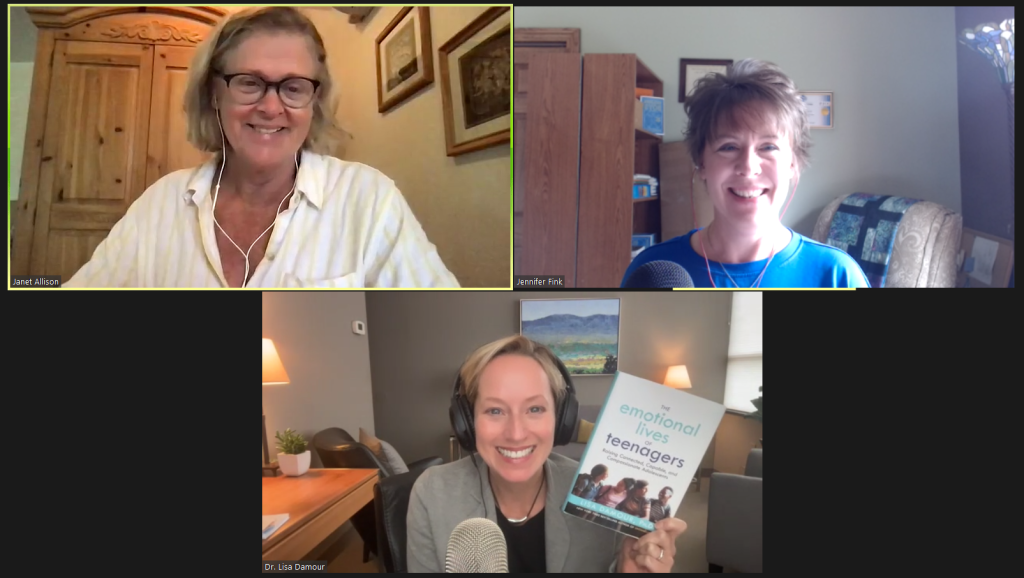Dr. Lisa Damour: Connecting with Teens
Manage episode 429495299 series 2604891
Dr. Lisa Damour says that adults should consider the barriers boys face when it comes to emotional connection and expression.
"Gender is such a huge force in how emotion is expressed, and perhaps even in how emotion is experienced," says Dr. Damour. "If a boy doesn’t feel that he has permission to let people know he’s hurting, it’s a good bet that he will discharge his unwanted emotions by acting out."
To Connect with Teens, Learn About Their Emotions
Dr. Damour served as an advisor on one of this summer's most popular films, Inside Out 2. (Haven't seen it yet? Go! It'll give you great insight into what's going on inside the brain of your teen.)

Boys may restrict their emotional expression due to societal pressures and gender norms. Dr. Damour highlights the stark contrast between the emotional expression allowed for girls and boys in our culture. Girls, she says, generally have a "wide emotional highway" to express a range of emotions, while boys are restricted to a "two-lane highway." And while it’s natural for humans to cry, boys who do so often face ridicule and social pressure, especially in environments like school.
Dr. Damour suggests that parents and educators can help boys by creating spaces for physical and alternative forms of emotional expression. Unlike the cultural preference for verbal expressions of emotion, many boys and men (and some girls, women, and nonbinary individuals) find relief through physical activities. Activities like shooting basketball hoops, running laps, or even banging on an old filing cabinet can be effective ways to discharge and process emotions.
"If it brings relief and does no harm, it’s a good coping strategy," Dr. Damour says. Additionally, music can be a powerful tool for many boys to express and regulate their emotions.
Practical Steps for Parents
To connect better with teenage boys and support their emotional development, parents can:
- Create Safe Spaces for Emotional Expression: Encourage physical activities that help boys process their emotions. Sports, music, or even creative projects can provide an outlet for their feelings.
- Acknowledge and Respect Gender Norms: Understand the societal pressures boys face and offer support without reinforcing harmful stereotypes. Validate their feelings and encourage healthy expression.
- Set Clear Expectations: While understanding the pressures boys face, maintain clear expectations for respectful and kind behavior. Teach boys that while it's okay to feel anger or frustration, it's not okay to express these emotions through harmful actions.
- Model Emotional Intelligence: Show boys how to handle emotions by modeling emotional intelligence in your behavior. Demonstrate how to talk about feelings and handle stress constructively.

Links we mentioned (or should have) in this episode:
drlisadamour.com – Lisa’s website
The Emotional Lives of Teenagers: Raising Connected, Capable, and Compassionate Adolescents — Lisa’s latest book (get the free parent discussion guide here)
Ask Lisa: The Psychology of Parenting – podcast hosted by Lisa Damour & Reena Ninan
Teen Boys’ Emotional Lives — ON BOYS episode
Managing Emotions — ON BOYS episode
Nonverbal Communication with Boys — ON BOYS episode
Sponsor Spotlight: Lumen
Understand your metabolism! Go to lumen.me/ONBOYS to save 15% on Lumen
Sponsor Spotlight: Dabble & Dollop
Natural bath products for kids. Visit dabbleandollop.com/onboys to get 20% OFF your first order!
Our Sponsors:
* Check out Armoire: armoire.style/ONBOYS
* Check out Artifact Uprising and use my code ONBOYS for a great deal: www.artifactuprising.com
* Check out ByHeart and use my code ONBOYS for a great deal: byheart.com
* Check out Lumen: lumen.me/ONBOYS
Advertising Inquiries: https://redcircle.com/brands
Privacy & Opt-Out: https://redcircle.com/privacy
341 episódios






